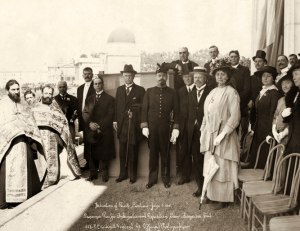
Abstract
This talk explores the participation of Greek Americans in universal expositions in the United States and their contribution to the representation of Greece in these spectacles. World’s fairs became one of the sites of economic, cultural, and social interactions in which Greek Americans defined their identities in relation to Greece and other groups in the United States. The stories of Greek Americans establishing a connection with Greece through world’s fairs varied. Even though Greece refers to the same geographical entity, what Greece meant for Greek Americans, as well as intra-communal relations between Greek groups in the United States, changed over time. As a large number of Greeks arrived in the United States, there were many among them who later left the region for Greece due to economic and ideological reasons. World’s fairs not only mirrored but also shaped these changes since they opened new pathways for Greeks to settle in the United States. Mutual interests between Greek Americans and the Greek government facilitated Greek participation since both sought to represent Greece favorably. The fairs further provided an avenue for Greek Americans to prove their contribution to their public visibility as “Americans.”
Bio
Semih Gökatalay obtained his bachelor’s degree in Economics at the Middle East Technical University, Ankara, Turkey, in 2013. He completed his Master’s thesis in the same field in 2015 and wrote a second Master’s thesis in Middle East Studies at the same university in 2016. He finished his Ph.D. in history at the University of California, San Diego in June 2024. His dissertation explored the political and economic history of the Ottoman Empire, the nation-states that succeeded it, and their diasporas in the Western world. He is currently working as an associate instructor teaching world and Middle East history in San Diego.
Date: Oct. 25, 2024
Time: 10 a.m. Pacific TimeZoom Access Details: Join Zoom Meeting
Meeting ID: 861 6013 2216 | Passcode: 296309
